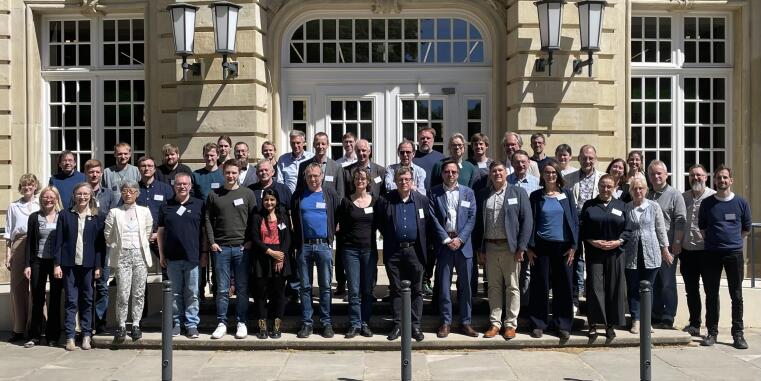

German Society for Planetary Research founded - A new milestone for the exploration of our solar system and beyond
Münster, 15 May 2025
It is with great pleasure that we announce the founding of the German Society for Planetary Research (DGP). This organisation was established to promote and network scientific research into the planets, moons, asteroids and comets in our solar system and extrasolar planetary systems.
Planetary research is a fascinating field that investigates the formation and development of these celestial bodies, not least in order to better understand the formation and development of the Earth. The Earth is the only celestial body that we know to harbour life. Almost 70 years after the beginning of the space age, we are able to reach all the different bodies in the solar system with probes and explore them up close. Our knowledge of these planets, moons and small bodies has grown exponentially since then.
State-of-the-art methods are used, from remote sensing using satellite telescopes and cameras, space missions with landing elements, rovers, helicopters and drones to sample returns that enable detailed analyses in the laboratory. In addition, earth-based telescopes are also becoming increasing-ly powerful. These diverse approaches contribute to a better understanding of the fundamental processes of our planetary system and to gaining insights that are also important for the protection and preservation of our home planet.
The DGP aims to make research in the field of planetary research more visible in Germany, to pro-mote scientific exchange and to strengthen cooperation between researchers, institutions and com-panies. The society is particularly keen to promote young talent in order to support the next genera-tion of scientists and engineers in this exciting field.
In addition to organising scientific events and conferences, the society will intensify the dialogue with politics, industry, research institutions and the public. The aim is to raise awareness of the im-portance of planetary research and to make the findings accessible to a broad public.
The society's members come from a wide range of disciplines, including planetology, geosciences, astronomy, physics, computer science and aerospace engineering. One of the major themes is the search for celestial bodies on which the conditions for the existence of life existed and may still exist today. This is why disciplines such as chemistry and biology are also playing an increasingly important role in planetary research. Together, these diverse disciplines are driving forward the exploration of our solar system. Planetary research is laying the foundations for future space missions, both for robotic missions and for the manned exploration of the moon and, in the future, even our neigh-bouring planet Mars.
We are looking forward to an exciting future and to unravelling the secrets of our solar system and other planetary systems together!
Contact
Prof. Dr. Heike Rauer (1st chair), rauer.heike@gmx.de
Prof. Dr. Bastian Gundlach (2nd chair) bastian.gundlach@t-online.de
Founding Day of the German Society for Planetary Research
When? May 15, 2025, 12:00–18:30 (from around 19:00 onwards: joint dinner – separate registration required)
Where? Senate Hall, University of Münster, Castle Schlossplatz 2, 48149 Münster
Map link
Preliminary Agenda:
• From 12:00 – Registration
• 13:00–14:00 – “Get-Together” (light lunch)
• 14:00–14:15 – Welcome Address (University Administration, Bastian Gundlach, Heike Rauer)
• 14:15–15:00 – Invited Lecture (Tilman Spohn)
• 15:00–15:30 – Coffee Break
• 15:30–16:30 – Planetary Research in Germany: Diversity, Key Players, and Future Perspectives (Heike Rauer, Bastian Gundlach)
• 16:30–18:00 – Official Founding Ceremony
• 18:00 – Closing Remarks
• Approx. 19:00 – Joint Dinner
Getting There:
By Car:
From the north, follow the B54 toward the city center. The castle is prominently visible on the right-hand side.
From the south, take the B219 or B51 to connect with the B54, then follow it until you reach the castle, which will be on your left.
Parking is available on-site.
By Train and Bicycle:
From Münster’s main train station, take Bahnhofsstraße straight to the Promenade. Turn left onto the green circular path and follow it for about 2 kilometers — it leads directly to the castle.
By Train and Bus:
From Münster’s main train station, take either bus line 11 (from platform C1) or line 12 (from platform B1). Both lines go to the “Landgericht/Schlossplatz Süd” stop. Buses run every 20 minutes.
Hotels:
• Agora: am Aasee
• Hotel International Am Theater
• Prize by Radisson
• Haus Niemann
• Best Western
• Factory Hotel
• Hotel Europa
• Mövenpick
• Stadthotel
• Münster Kongresscenter by Meliá Hotel
• H4 Hotel
• Hotel Conti
Questions:
For further questions, feel free to contact Tina Rückriemen-Bez via the following email-address tina.rueckriemen-bez@uni-muenster.de.

